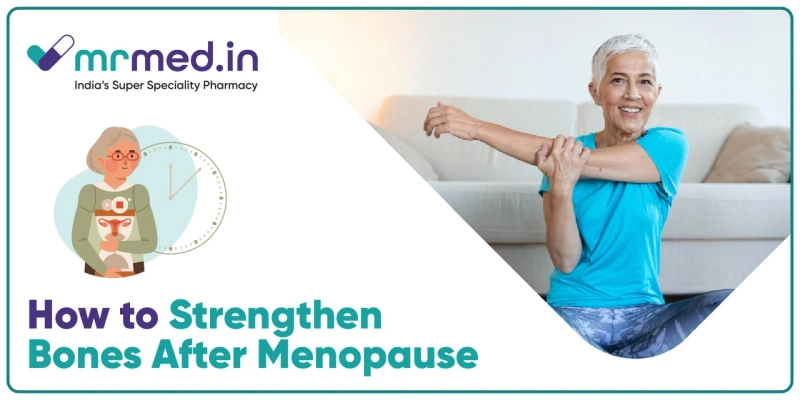After a certain age, many women begin to notice subtle signs of change, a bit of stiffness in the joints, slower recovery after a fall, or unexpected back pain. These changes are not just part of ageing; they’re often the result of how bones naturally lose density after menopause. The drop in estrogen during this stage has a major impact on bone health, making it more fragile and prone to fractures. Fortunately, the right habits and treatments can help women maintain strong, resilient bones for years to come.
The Link Between Hormones and Bone Health
Estrogen is vital for maintaining bone density throughout a woman’s life. It keeps bone cells balanced by slowing bone breakdown and supporting the creation of new tissue. When menopause begins, estrogen levels fall sharply, tipping the balance toward faster bone loss.
This hormonal change can lead to a condition called Osteoporosis, in which bones become porous and fragile. The disease progresses quietly; many women don’t realise they have it until they suffer a fracture. Early awareness, however, can change that outcome. Regular check-ups, a balanced diet, and preventive therapy make it possible to slow or even reverse bone thinning.
Why Bone Loss Accelerates After Menopause
In the years immediately following menopause, women can lose bone mass at nearly twice the rate of men of the same age. The spine, hips, and wrists are the most commonly affected areas. The causes include:
- Reduced estrogen production
- Lower calcium absorption from food
- Decrease in muscle strength and balance.
- Inadequate vitamin D exposure
- Sedentary lifestyle
Even small everyday habits, such as skipping outdoor walks or consuming too much caffeine, can gradually weaken bone structure. Recognising these triggers helps create an effective prevention plan.
Nutrition: The Foundation of Strong Bones
A nutrient-rich diet is the first step in protecting bone health. The body needs specific vitamins and minerals to maintain density and flexibility.
- Calcium: The main building block of bone. Dairy products, almonds, tofu, and leafy greens are excellent sources of essential nutrients.
- Vitamin D: Helps the body absorb calcium effectively. Morning sunlight, fortified cereals, and fish like salmon and sardines boost vitamin D levels naturally.
- Protein: Maintains muscle mass, which supports and protects the skeleton. Include lentils, eggs, and lean meat in meals.
- Magnesium and Zinc: Essential for bone repair and growth, found in nuts, seeds, and whole grains.
Balanced nutrition works hand in hand with medical therapy to keep bones dense and healthy after Menopause.
The Power of Movement
Physical activity signals bones to stay strong. Weight-bearing and resistance exercises create tiny stresses in the bones that stimulate new growth. Activities like walking, climbing stairs, dancing, or yoga improve posture and coordination, lowering the risk of falls.
Strength training two to three times a week also preserves muscle tone, which acts as natural armour for the bones. Flexibility exercises such as Pilates or tai chi maintain balance and joint mobility, equally crucial for bone safety.
The Role of Medical Therapy in Bone Protection
When lifestyle changes are not enough to control rapid bone loss, medical treatments provide additional protection. Doctors often recommend supplements or medications to enhance bone formation or reduce breakdown.
One of the advanced treatment options for severe Osteoporosis is TPT 20 Injection. This medicine contains teriparatide, a synthetic form of parathyroid hormone that directly stimulates bone-forming cells. Unlike traditional medicines that only slow bone loss, it encourages the body to build new bone tissue.
It is generally prescribed for postmenopausal women who have suffered fractures or are at very high risk. The injection is administered once daily under medical supervision, often for 18–24 months, and is combined with calcium and vitamin D supplements for best results. Clinical studies show that patients experience significant improvements in bone density and strength, helping reduce future fracture risks.
Regular Check-ups and Bone Density Tests
Bone strength can be measured through a DEXA (Dual-Energy X-ray Absorptiometry) scan, which provides a detailed picture of bone density. Doctors use a T-score system to interpret results:
- Above –1.0: Normal bone density
- Between –1.0 and –2.5: Early bone loss (osteopenia)
- Below –2.5: Confirms Osteoporosis
Routine scans every one to two years help detect problems before fractures occur. Women receiving treatments are usually monitored closely through these tests to evaluate progress.
Everyday Habits That Make a Difference
Apart from medication, simple day-to-day actions can protect bone health:
- Maintain good posture to reduce pressure on the spine.
- Limit caffeine and carbonated drinks, which can affect calcium balance.
- Avoid smoking and minimise alcohol intake.
- Stay hydrated. Dehydration can slow down the body’s natural repair mechanisms.
- Get at least seven hours of sleep; bone remodelling occurs most efficiently during rest.
These small efforts add up to stronger bones and better overall health.
Emotional and Mental Well-Being
The emotional effects of menopause and declining bone strength can sometimes be overlooked. Fear of fractures or reduced mobility can lead to anxiety and withdrawal from physical activity. Staying socially active, joining group exercise programs, or consulting a counsellor can make recovery more positive. A confident mindset directly influences lifestyle consistency, which is key to bone health improvement.
Building Long-Term Strength and Confidence
Bone protection after menopause isn’t a short-term goal; it’s a lifelong commitment. Combining regular exercise, proper nutrition, and prescribed therapy provides the best defence against Osteoporosis. Advanced options have given women renewed hope to rebuild bone mass and live without the constant worry of fractures.
Prevention works best when started early. Even if menopause has already set in, adopting healthy habits and following medical advice can significantly improve quality of life.
Final Thoughts
Weak bones are not an inevitable part of ageing. With timely medical support, the right diet, and active living, postmenopausal women can stay strong, confident, and independent. Advances in treatments and better awareness about Osteoporosis ensure that women today can take charge of their health and enjoy full, active lives long after menopause.



